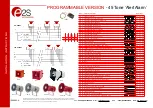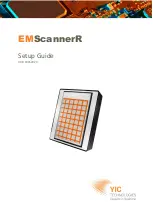
New titanium plate
Erosion still permissible, plate
can be polished
Start of pitting, milling or grind-
ing necessary
Limit value for erosion ex-
ceeded, replacement necessary
5
Cleaning and maintenance of the homogeniser
To achieve an optimum lifespan for the homogeniser, cleaning and maintenance should be
conducted regularly.
CAUTION!
Always disconnect the homogeniser from the mains before performing cleaning/maintenance.
Do not rinse or immerse the homogeniser in water and do not expose it to splash water.
A warranty will not apply to damages caused by the use of unsuitable disinfection agents
or detergents.
5.1
Cleaning and care
Probes
All probes are subject to process-related wear, which leads to erosion on the sound-emitting
surface and thus to a reduction in power.
In the case of frequent use, it is recommended that an inventory supply of probes be kept.
Examples of wear, e.g. on titanium plate TT 13:
The sound-emitting surfaces can be carefully polished or milled a few times. If abrasion of material
due to erosion or post-processing exceeds a value of approx. 1 mm, or if there is no power display
on the generator, the probe is non-resonant and can no longer be used.
Reconditioning of the sound-emitting surface:
Reconditioning can be performed using a grinding machine with a
fi
ne grinding wheel of suitable
grain size, or by hand using a diamond
fi
le. Suitable grinding materials are, for example:
•
Fine abrasive wheel, polyurethane-bound – grain size 150
•
Fine abrasive wheel, rubber-bound – grain size 120
•
Grinding wheel PNK, corundum – grain size 180 ... 280
• Diamond
fi
le, D 181 or D 251
UW/ HF generator
• Do not use any abrasive cleaners, only commercial care products without abrasive additives.
•
Wipe down only the exterior of the housing with a damp cloth and leave to dry or wipe dry.
27 / 44
51436a GB/2017-10
1
electronic GmbH & Co. KG • Heinrichstraße 3-4 • 12207 Berlin • Deutschland • info@bandelin.com
















































